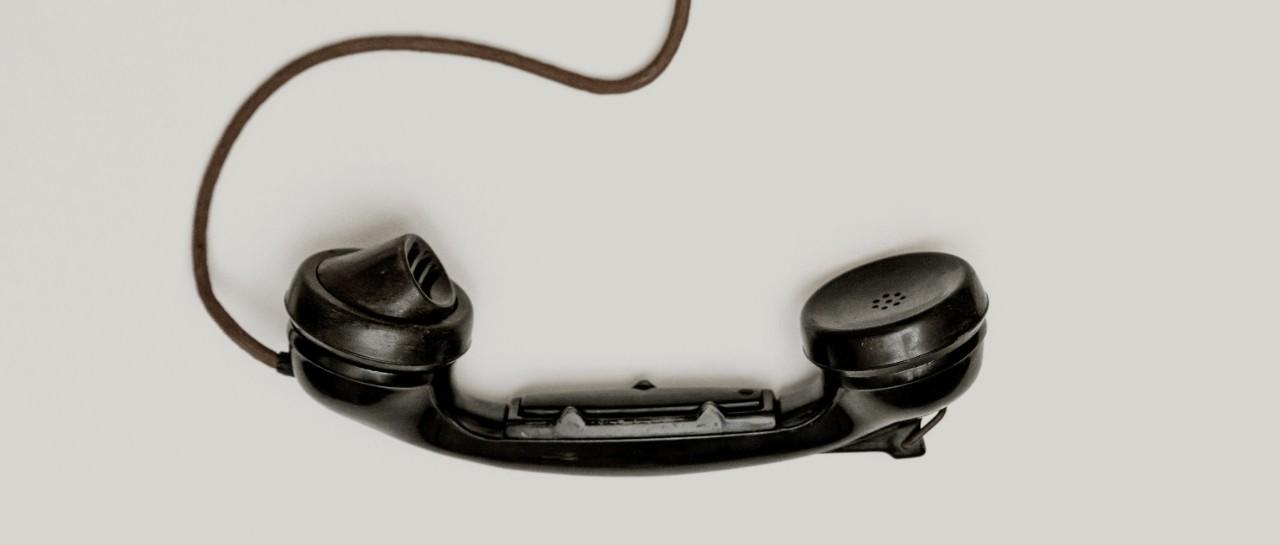
What it's like to work for a suicide prevention helpline
Peer reviewed by Dr Sarah Jarvis MBE, FRCGPLast updated by Ashwin BhandariLast updated 12 Sept 2019
Meets Patient’s editorial guidelines
- DownloadDownload
- Share
- Language
- Discussion
Opening up to anyone when you're in a vulnerable state can be difficult, let alone a faceless stranger on the end of a telephone line. But what's it like receiving these calls? We speak to two Samaritans volunteers about what they've learnt about the art of listening and helping those in need.
In this article:
There are many different reasons why someone might volunteer for a crisis helpline. For John Loden, it was because he'd lost four loved ones to suicide over the last 15 years.
"I wanted to give time - rather than money - as I'm semi-retired and wanted to give something back," says the Samaritans' deputy director of communications.
The official government figures show the suicide rate is the highest it's been since 2013. Men are at higher risk than women - accounting for 3 in 4 suicides in the UK in 2018. Suicide is the largest preventable cause of death in men and women in the UK between the ages of 20-34 and the group most at risk is 45- to 49-year-old men.
CALM (Campaign Against Living Miserably) suggest that by reassuring the person that suicidal thoughts/feelings won't last forever, this can give them more clarity on how to deal with the situation at hand. But how exactly do we achieve this?
Continue reading below
Listening to, not fixing, problems
According to NHS England, one in five of us have suicidal thoughts at some point. These thoughts rarely start from one particularly traumatic event - they often build up over time. Listening when someone is distressed may prevent the situation from becoming more serious.
The main skill that crisis callers learn is active listening. This technique requires that the listener fully concentrate, understand, respond and then remember what is being said rather than trying to provide a foolproof solution.
This allows the caller to vent and reflect on their feelings.
For example, if someone called up about an argument they had with their partner, the Samaritans caller would ensure that they would listen to what the caller has to say, rather than judge who is 'right' or 'wrong' in the situation.
Ralph Nichols, credited with first researching the field of listening, observed: "Listening is hard work. The poor listener grows impatient, while the effective listener uses the extra processing time to process the speaker's words, distinguish key points, and mentally summarise them."
The three As of active listening are:
Attention - when we give someone all of our attention the speaker responds positively by interacting on a deeper level, perhaps by disclosing personal information or by becoming more relaxed.
Attitude - putting yourself in a positive mind frame whilst listening.
Adjustment - often when we hear someone speak, we don't know in advance what they are going to be saying. So, we need to be flexible, willing to follow a speaker along until they have made their point.
What motivates someone to volunteer?
Deputy director of Ongoing Training at Samaritans, Jeanene Mckenna, joined the charity over 15 years ago after spending time teaching English to children in poor areas of Africa.
She recalls: "I have always had a feeling that we all have a responsibility to do more than look after ourselves and our 'nearest and dearest' and fulfil a commitment to our communities. I looked into various organisations but most of them didn't fit with my work schedule. Samaritans offered amazing flexibility both in terms of when I could go through the training as well as fulfil my commitment on shift."
She continues to be a listening volunteer alongside her other responsibilities which requires attending regular shifts three times a month (15 hours in total) to answer phones, receive face-to-face visitors and answer emails and texts. Her main role as Deputy Director requires co-ordinating 400 volunteers to attend five hours of training per year, as well as an annual conference.
Volunteers for crisis helplines are never shown the number of the person calling, and no two calls are ever the same. Often people call up simply because they are lonely and want human contact during antisocial hours. Unless the caller hangs up, the conversation is ended mutually and the volunteer will listen for as long as necessary.
Aside from suicide, the most frequent topics that come up in calls include self-harm, mental health issues, criminal activity, child protection, financial difficulties, relationship issues and domestic violence.
"We never try to 'fix' people's problems nor do we judge our success on them 'feeling better' at the end of a call. When you know the caller is really in the depths of sadness and there is absolutely nothing you can do to help, it can be really hard," she explains.
"When we are in the phone room, we are often taking calls from some of the most depressed, despondent, vulnerable people and this can be quite difficult. Some calls are more difficult than others and those can be tough and can take a bit of a toll. However, the fact that we are there and that they have someone to talk to feels right, hence my sentiment that it's a very positive experience."
Continue reading below
How volunteers manage their mental health
Mckenna says that despite the serious nature of the training, it eventually became rewarding to work in a group of people from 'all different walks of life'.
"I feel that being on shift helps me to put my problems into perspective. We have a lot of callers who have many problems (eg relationships, financial, health, legal) and so hearing about the difficulties they are facing does give amazing perspective about one's challenges," says Mckenna.
"I think that because mental health is a big part of my life, given the number of hours we volunteer for Samaritans, I'm very aware of my own mental health and have developed a lot of skills to help myself. Hopefully my friends and family can benefit too."
The training involves preparing volunteers for every scenario possible in a supportive, nurturing environment. For those who are going through a tough time themselves, the 'family of peers' (the network of volunteers) ensures that no matter how difficult the call, there's always support for whoever has to deal with it on the other end.
"If potential volunteers approach us about volunteering but they have recently attempted suicide or they've been recently bereaved by suicide, we'll talk it through with them to find out if now is the best time for them to volunteer with us. We won't turn them away from applying to become a Samaritan but we'll certainly find some space to explore timing, motivation," says Mckenna.
She adds: "I guess it also comes down to the idea that 'support' is not finite. Just because I am on the phone supporting someone else with their mental health challenges doesn't mean that I can't take time out for myself to make sure that I am also addressing any challenges that I might be facing with my own mental health."
What we can all do to help vulnerable people
We can learn a lot from crisis helplines about the art of listening - and how vital that is in supporting people. In moments of distress, a simple conversation could be a matter of life or death.
For example, if a friend had an argument with their partner and turned to you for help, you could ask how long this has been an issue for rather than taking sides.
As useful as they may be, crisis helplines are often a short-term solution to long-term issues. They can't replace well-funded mental health services and do not offer a long-term plan for vulnerable people, especially when jobs and financial security are at risk.
Due to seemingly endless government cuts and excessively long wait times for NHS mental health services, it can be hard to remain positive and look after ourselves in the UK's current political climate.
An analysis of crisis helplines found that 78% of people who call are already undertaking a form of mental health care treatment, which suggests that those seeking crisis helplines are doing so for extra, impartial support.
Dr Sarah Jarvis, GP and Clinical Director of Patient.info, points out: "People often find the support they get from their mental health department very helpful, but there just isn't enough of it. You may be given regular appointments, but the waiting times to access them can be very long, they may not happen that often and the vast majority of people don't have an emergency number they can call to access their NHS team. Mental health problems don't keep to a 9-5 schedule."
Mckenna feels there's always more that could be done to help people who are distressed.
"As much as I love Samaritans and think that the service we provide is incredibly valuable, it doesn't seem right that we are all that some callers feel they have. As a society, we are failing these people; we're failing each other."
Patient picks for Depression

Mental health
What are the signs of depression in men?
Everyone feels down sometimes, but when feelings of sadness persist it can be the sign of a bigger problem, such as depression. Men often hide mental health issues due to stigma, so it's important to recognise the signs and symptoms of depression1.
by Lydia Smith

Mental health
The reality of life after surviving a suicide attempt
The Office for National Statistics (ONS) reports that there were 5,224 suicides registered in England and Wales in 2020. The evidence of rising suicide rates in recent years is alarming, with 75% of suicides being male. As important as it is to discuss suicide prevention, we should also consider life after a suicide attempt. Rebuilding your life after an attempt can be challenging.
by Emily Jane Bashforth
Article history
The information on this page is peer reviewed by qualified clinicians.
12 Sept 2019 | Latest version

Ask, share, connect.
Browse discussions, ask questions, and share experiences across hundreds of health topics.

Feeling unwell?
Assess your symptoms online for free
Sign up to the Patient newsletter
Your weekly dose of clear, trustworthy health advice - written to help you feel informed, confident and in control.
By subscribing you accept our Privacy Policy. You can unsubscribe at any time. We never sell your data.